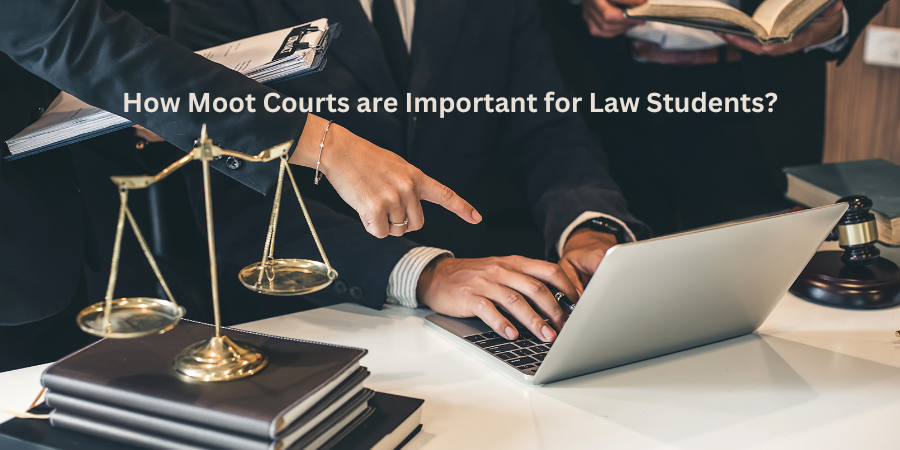Have you ever wondered what it would be like to be a lawyer in a courtroom, arguing a case before a judge and a jury? If you are a law student, you don’t have to wait until you graduate to experience this thrill. You can participate in moot court, a simulated court proceeding where you can hone your legal skills and knowledge in a competitive and realistic environment.
This blog will tell you what moot court is and why it is important for law students.
What is a moot court?
Moot court is a form of legal education that involves researching, writing, and presenting oral arguments on a given legal issue or problem. The term “moot” means “open to discussion”, and reflects the fact that moot court cases are usually based on unsettled or controversial areas of law. Moot court cases can cover any branch of law, such as constitutional law, international law, criminal law, human rights law, etc.
Moot court is not only a co-curricular activity but also a valuable learning experience for law students.
Why Moot Courts are Important for Law Students

Moot courts are vital for law students as they offer practical legal skills, courtroom experience, and opportunities for honing research, oral advocacy, and writing abilities. These competitions foster critical thinking, teamwork, and problem-solving while building confidence and valuable networks with legal professionals. Participating in moot courts enhances a student’s resume and provides a competitive edge in the legal job market, making them well-prepared for a successful career in law.
Benefits of participating in moot court:
Participating in moot court competitions offers numerous benefits to law students:
-
Gain skills in both written and oral advocacy
- The moot court requires students to prepare written memorials or memoranda for both sides of the case, which are usually judged before the oral rounds. Writing a good memorial involves identifying the relevant issues, researching the applicable laws and precedents, applying them to the facts of the case, and presenting them in a clear, concise, and persuasive manner. Writing a memorial also helps students improve their citation, formatting, and editing skills.
- Oral advocacy is the most visible aspect of moot court, where students present their arguments before a panel of judges, who may interrupt them with questions or comments. Oral advocacy requires students to have a thorough knowledge of the case, the law, and the facts, as well as the ability to communicate effectively, respond to questions confidently, and rebut the opponent’s arguments logically. Oral advocacy also helps students develop their public speaking, voice modulation, body language, and courtroom etiquette skills.
-
Build confidence and overcome stage fright
Mooting is a challenging and nerve-wracking activity, especially for beginners. However, with practice and feedback, students can overcome their stage fright and gain confidence in themselves and their arguments. Mooting also exposes students to different types of judges, opponents, and audiences, which helps them adapt to different situations and expectations. Mooting also teaches students how to handle pressure, criticism, and failure gracefully.
-
Engage in legal analysis in a variety of areas of law
Moot court problems are usually based on unsettled or emerging areas of law, such as constitutional law, human rights law, international law, arbitration law, etc. Mooting gives students an opportunity to explore these areas of law in depth and apply them to realistic scenarios. Mooting also helps students to develop their analytical and critical thinking skills, as they have to identify the strengths and weaknesses of both sides of the case, anticipate the counter-arguments of the opponent, and formulate their own arguments accordingly.
-
Understand legal issues from different perspectives
Mooting requires students to argue both sides of the case impartially and convincingly. This helps students understand legal issues from different perspectives and appreciate the complexity and diversity of legal reasoning. Mooting also encourages students to be open-minded and respectful toward different opinions and viewpoints.
-
Learn to work in teams and learn from others
Mooting is usually done in teams of two or three members who have to work together throughout the preparation and presentation of the case. Mooting teaches students how to collaborate effectively with their teammates, divide the workload, coordinate their arguments, support each other, and resolve any conflicts or disagreements. Mooting also gives students an opportunity to learn from others, such as their coaches, mentors, seniors, judges, opponents, etc., who can provide them with valuable guidance, feedback, suggestions, and insights.
-
Network with potential employers and peers
Moot court competitions are attended by various legal professionals, such as lawyers, judges, academics, etc., who can offer students career advice, opportunities, or references. Moot court competitions are also a platform for students to interact with their peers from different colleges or countries who share a common interest in law. Mooting helps students build their professional network and reputation in the legal community.
Conclusion:
Participating in moot court is like a must-do activity for law students. It’s a bit like practice rounds for future lawyers. When students engage in moot court, they learn many important skills that will come in handy when they start working as lawyers. These skills aren’t just for the courtroom; they’re useful in all sorts of legal jobs.
What’s more, moot court isn’t just about skills. It’s also like a treasure trove of legal knowledge. Students dive deep into the law, understanding it from all angles. This not only makes them better lawyers but also enriches their minds.
But there’s more! Moot Court does something even better: it helps students grow as people. It boosts their confidence, hones their public speaking abilities, and generally makes them more awesome individuals.
So, if you’re studying law at the best law academy in Ghaziabad, give the moot court a shot during your studies! It’s like a triple win: skills, knowledge, and personal growth!






